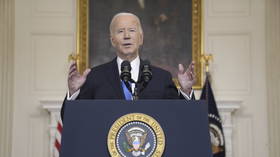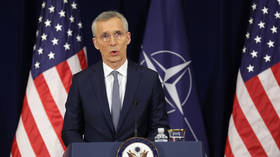
Washington’s role in the military alliance is a “sacred commitment,” not a “burden,” according to the US president

© AP / Evan Vucci
US President Joe Biden slammed his predecessor Donald Trump’s recent comments regarding NATO on Tuesday, accusing the Republican frontrunner of “bowing down” to Moscow by calling for Washington’s European allies to pay their share of defense costs.
Trump’s suggestion during a Saturday rally that he had told an unnamed NATO member Russia could “do whatever the hell they want” with the country because it hadn’t “paid its bills” was “dumb,” Biden insisted.
“It’s shameful. It’s dangerous. It’s un-American… Imagine a former president of the United States saying that. The whole world heard it. The worst thing is he means it,” the US leader continued, claiming that Trump’s remarks meant he had “bowed down to a Russian dictator.”

“When America gives its word, it means something. When we make a commitment, we keep it and NATO is a sacred commitment,” Biden claimed. “Donald Trump looks at this as if it’s a burden.”
Biden had already denounced his rival’s remarks, calling them “appalling and dangerous” on Sunday. In that statement, the president claimed his predecessor had effectively said he would “abandon NATO allies if Russia attacks” and give Russian President Vladimir Putin a “green light for more war and violence.”

While Biden on Tuesday accused Trump of trying to “walk away from NATO,” the former president subsequently argued he was merely trying to get Washington’s allies to pay the 2% of GDP all members committed to in 2014. The Republican frontrunner does not even oppose the idea of providing military aid to Ukraine, merely suggesting the US “give it to ‘em as a loan” in his remarks at the rally.
The Senate approved a $95.3 billion foreign aid package for Ukraine, Israel and Taiwan on Tuesday, sending it to the House. Speaker Mike Johnson had previously indicated he would stonewall a vote due to the lack of provisions in the bill aimed at reducing the record levels of illegal immigration via the US-Mexico border.




